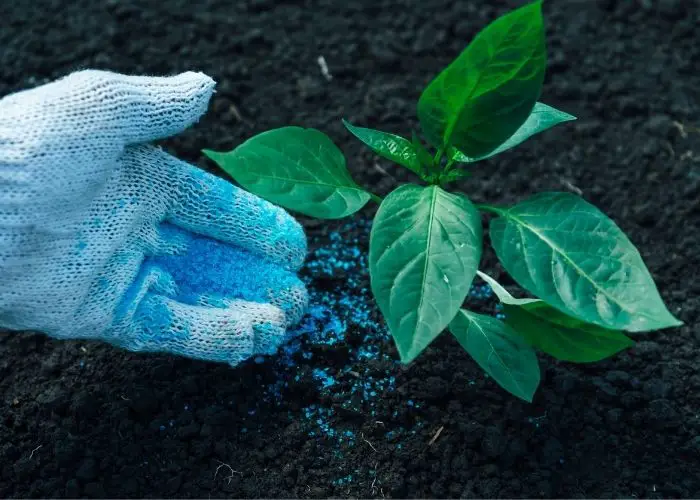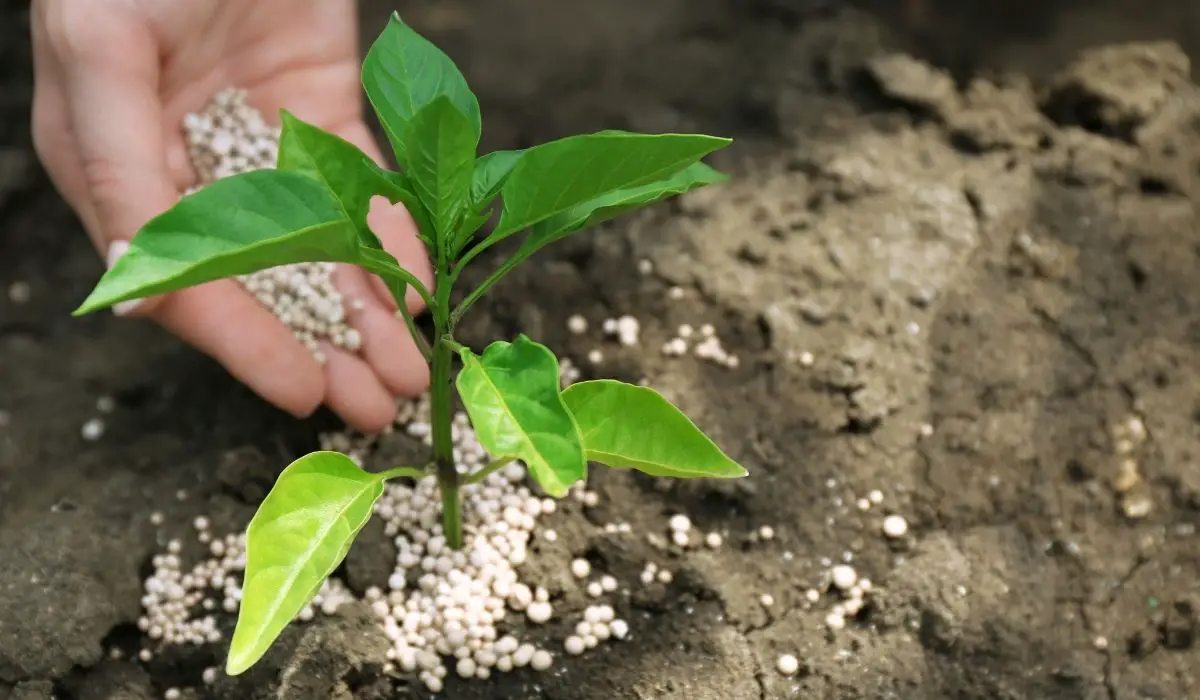Last Updated on March 10, 2022 by Griselda M.
When attempting home gardening, it’s crucial to know when to apply fertilizer to your vegetable garden so you can get a perfect harvest at the end of the season. The quantity of fertilizer combined with the wrong time has a counter effect. Yes, your garden can have too much of a good thing, and your goods can suffer the consequences.
Read on to learn the fines of picking the right fertilizer and application period.
When To Fertilize Vegetable Garden
The best time to start preparing your vegetable garden is 6 to 8 weeks before the last frost. Springtime is ideal for most crops. Start by planting the seeds in small pots indoors. Transfer them to the garden bed after the last spring frost.
Pick a section of your garden with the best growing conditions. The majority of vegetables need around 6 hours of sunlight per day. They will tolerate partial shade but not very dark parts of your garden.
Fertilization takes place during the growing season. The frequency depends on the type of soil you’re working with. For example, porous soil will need more frequent fertilization, while clay requires less. You need to apply fertilizer to your vegetable garden every 3 to 4 weeks.
Just like too much water can damage your vegetables, fertilizer can do the same. You can go overboard and hurt the veggies instead of helping them.
You need to choose the right fertilizer and the proper interval. Even if your soil is nutrient-rich, an extra push will help the vegetables reach their full potential.
What’s Vegetable Garden Fertilizer?
We consume food every day but still go for supplements to replenish what we’re missing. Think of fertilizer as a supplement for your vegetables. Different people require different supplements. The same goes for vegetables. Each type needs particular vitamins and minerals that the soil can’t provide in full.
Plants take up every nutrient they can from the soil. If you’ve grown other vegetables, fruits, or plants in the same ground, it’s stripped of nutrients. That’s why it’s essential to check what type of soil you’re working with before you apply fertilizer to your vegetable garden.
How To Fertilize Vegetable Garden
The first approach is to apply fertilizer to the soil in which you’re transplanting your vegetables. Assuming you’ve grown your seeds indoors before springtime, they don’t need liquid fertilizer. A small amount of granular fertilizer worked in a few inches into the soil works best. It will dissolve in time as you water your veggies.
The second approach regards your older plants. The perennials have been dormant the whole winter, so they need some nutrients to develop. After your last spring frost, apply some liquid or granular fertilizer.
The growing season is different for each vegetable. Leafy greens grow in spring, so they need more fertilizer at planting. Long-season crops need a tiny amount of fertilizer when planting and much more during mid-season. Tomatoes are one of the vegetables that benefit significantly from fertilization. After blooming, they require a large number of nutrients to produce perfect results.
Liquid Vs. Granular Fertilizer
You should apply liquid fertilizer to your vegetable garden at least two weeks after planting. Water the vegetable plant completely and then use the diluted fertilizer. Improperly diluted fertilizer can burn the roots and leaves. Don’t apply after transplanting! Some root break during transplanting. Applying fertilizer right after will reach the breakage and burn the roots, resulting in a dead vegetable plant.
If you’re using a spray fertilizer, apply it on dry but not too sunny days, ideally in the morning.
Granulated fertilizer needs to be spread out on the soil surrounding your vegetables. You can scatter it before or after planting. Water right after and work it in no further than 5 inches into the ground. As the season progresses, use a larger quantity in the upper layer.
The Best Fertilizer For Your Vegetable Garden
Many gardeners use various fertilizers during the season. There are liquid, dry, and water-soluble kinds. But what concerns most of us nowadays is the difference between natural, organic, and synthetic fertilizers. What’s the effect of each, and can you use just one type?
Organic Fertilizers
Organic fertilizer is not a new invention. Think of compost, manure, fish emulsion. They contain micro-organisms that slowly break down into the soil and feed the plant. Most organic fertilizers are slow-release which means they don’t provide all the nutrients at once.
Fertilizer can make its way into underground waters, but there’s no environmental threat when it’s organic. Organic fertilizer is more expensive than synthetic, however, it’s less frequently applied.
Processed Fertilizers
Synthetic or processed fertilizers are made out of mineral rocks. They’re quick release and water-soluble, so you need to apply small quantities more often. They can save your vegetables when they need a fast injection of nutrients. Synthetic fertilizer contains sodium and potassium chloride, phosphate, nitrogen, and more.
The quick-release of these nutrients can damage the new fragile vegetables. As a result, some manufacturers started producing coated synthetic fertilizers with slow release.
Vegetable Garden Fertilization Do’s & Don’ts
- Test your soil before fertilizing. Contact your local cooperative extension, and they will guide you through the process. Soil tests are affordable and even free in some states.
- Always follow the manufacturer’s instructions when diluting and applying. Fertilizers are labeled with numbers. They serve as a description of how much of each nutrient is inside. The three primary nutrients are potassium, phosphorus, and nitrogen.
- Don’t apply fertilizer to your vegetable garden before heavy rains. The rain makes its way into the underground waters, taking a portion of the fertilizer along.

Final Say: Applying Fertilizer To A Vegetable Garden
A vegetable garden requires frequent fertilization with organic or processed fertilizer. You need to apply a small amount when you plant the vegetables in spring and a larger quantity during the growing season. This is because vegetables need more nutrients after blooming.
You can choose between liquid, dry, granulated, and water-soluble fertilizers. It’s important to follow your vegetables’ reaction and use adequate doses.
What type of fertilizer do you use? Have you performed a soil test so far?
Find out all about How To Pick Mint Leaves From Your Garden.
Mary is a passionate gardener who loves spending her days getting her hands dirty and nurturing her plants. She‘s an avid reader of gardening magazines and is always looking for new ways to make her garden thrive. When not outside tending to her plants, Mary can be found inside reading up on the latest gardening trends, comparing notes with fellow gardeners, and finding the perfect pottery planter for her next planting project.


